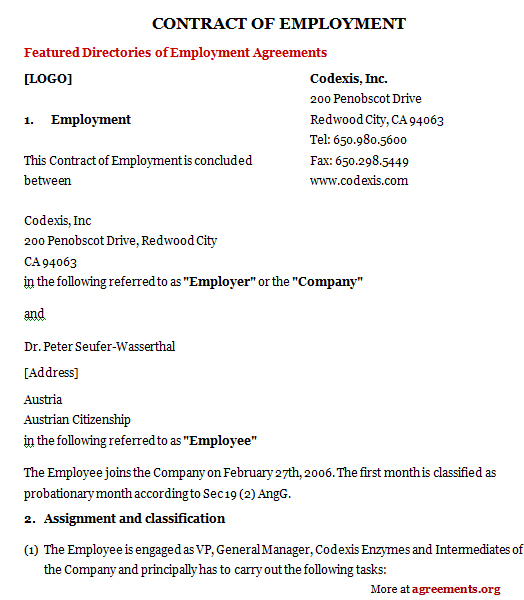What Is an Employment Contract?
An employment contract is between an employer and an employee. It governs the conditions of employment of the employee and lists the rights and obligations of both parties. It serves as a roadmap for the employer-employee relationship and makes both parties aware of what is expected of them. It can be used when hiring people for fixed-term or permanent employment.
In the United States of America, it is not mandatory to have a written employment contract. Most employees work at will; that is, they can leave the job any time or can be removed at any time for a legal reason. Such an agreement is called an at-will employment contract, which is presumed to be the case in the absence of a written employment agreement stating otherwise. While a written contract is not required, the state or local laws may require some particular information to be in writing.
Key Terms in an Employment Contract
The following are some important terms to be incorporated in an employment contract:
- Names of the parties
- Employee’s intention of entering into employment
- A Position that the employee is hired for
- Term of employment
- Compensation of the employee
- Vacation and leave policy
- Probation period, if any
- Benefits are given to the employee
- Obligations of the employee
- Duties of the employer
- Grounds for termination
- Non-compete clause
- Governing law of the agreement
- Dispute resolution
- Signature of the parties
How to Draft the Employment Contract?
The following points should be noted when drafting this contract:
- State the term of employment- it may be indefinite until it is terminated or for a fixed term.
- Clearly mention the position and the title for which the employee is being hired. State the specific job description and duties of the employee related to the job.
- One of the highly negotiated clauses of this contract is that of compensation. Whatever the parties agree to should be put down in writing in clear terms. Cover all aspects of compensation such as basic pay, raises, bonuses, expenses, and when they will be paid. Include the benefits that the employer has agreed to provide the employee, such as health insurance, paid leave, retirement benefits.
- In matters relating to performance review, state how often such reviews will take place and their consequences.
- Enumerate the obligations of the employee, such as working for the employer’s best interests, undertaking travel whenever necessary, observing confidentiality with respect to business information.
- In addition to the previous point, include the duties of the employer, such as providing a safe working environment, not discriminating among employees on the basis of race, country, sex, religion, or any other factor and timely payment of remuneration.
- State clearly the grounds for termination of the agreement. This is an important clause and should be carefully drafted to avoid any litigation in the future. Include the notice requirements in case of termination of employment. It is prudent to include a set of circumstances where the employee may be terminated without giving notice.
- The employer may choose to include restrictive covenants such as non-compete clause, which means that the terminated employee cannot work for a competitor for a certain period of time or a non-solicitation clause, where the employee is prohibited from soliciting clients of the employee. These covenants are difficult to enforce. Hence, they must be drafted diligently according to the needs of the business.
- Ensure that the contract mentions the governing law. This avoids jurisdictional and other related disputes. In addition to this, the dispute resolution mechanism should be clearly stated. Usually, arbitration is preferred as a method to resolve disputes due to its numerous advantages over litigation.
It must be noted that all the provisions in the contract have to be consistent with various federal and state employment laws as well as any other relevant law in force at that time.
Types of Employment Contract
An employment contract can be of the following types:
- Written: As mentioned above, a written contract sets the terms and conditions of employment, such as the term of employment, duties of the employee and employer, and grounds for termination.
- Oral: An oral employment contract is simply an agreement entered into verbally. For example, an employer may make an offer on the phone. If the other person accepts it, he becomes an employee, and the agreement binds them legally. However, it is difficult to prove oral contracts.
- Implied: An implied employment contract is one which is implied from the employer’s statements and conduct. It is neither written nor expressly stated by can be inferred from words and actions.
- At-will: As stated above, an at-will employment contract is one where the employer can be fired at any time, or he can quit at any time for reasons that are not in violation of the law.
Sample Employment Contract Agreement
You can Download the Free Employment Contract customize it according to your needs and Print. Employment Contract is either in MS Word, Excel, or in PDF.
